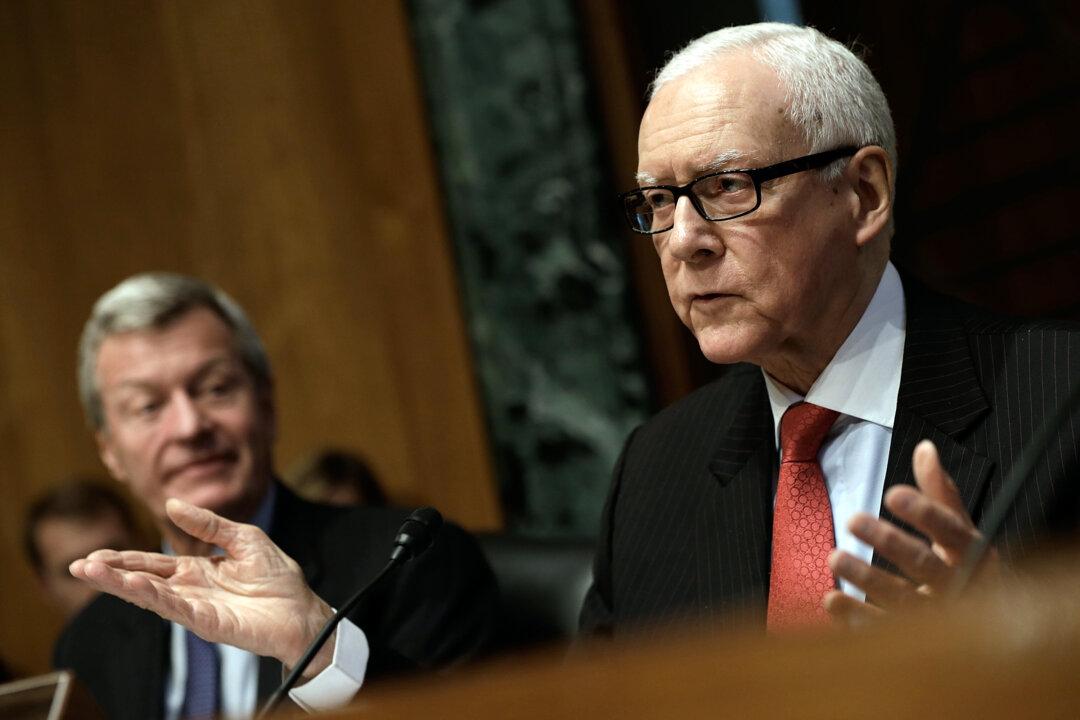WASHINGTON—Former Internal Revenue Service Commissioner Douglas Shulman told a Senate panel Tuesday that he had purposely distanced himself from the activities of the IRS Determinations Unit because as a political appointee, he could not be completely nonpartisan regarding an organization’s political advocacy.
“As a commissioner I didn’t get involved in a single case with a 501 (c)(4) that I can remember and it was a general policy that I wouldn’t,” he said at a Senate Finance Committee hearing on the IRS scandal.
Shulman was appointed by President George W. Bush in 2008 and finished his term in November 2012. It was under his watch that conservative groups were targeted by the IRS Determination Office in Cincinnati when they had applied for tax exempt 501(c)(4) status.
The status, a result of the Supreme Court’s Citizens United ruling, allows public advocacy groups to engage in political activity and spending, provided their primary purpose is social welfare and not electoral campaigns. These organizations, which fall under the IRS rubric social welfare organizations, do not have to disclose their contributors.
Article Continues after the discussion. Vote and comment
[tok id=74129d0c1166834774ad8edd40eb64ee partner=1966]Related discussion: Did your approval of the president change, following the recent scandals?
Shulman said he was “dismayed” when he read the inspector general’s report on the extent of the targeting. He admitted that it occurred under his watch but refused to concede that he was responsible.
“I think it is inappropriate actually for a presidential appointee, regardless of which party they are appointed by, to be getting involved in cases that scrutiny and decisions have to be made around political activity.”
Dr. John Hudak, political analyst with the Brookings Institution, blames IRS management for the scandal. Normally a political appointee, and particularly a Democratic appointee, would have jumped at any hint of targeting right away.
“They would have put a stop to that because the benefits are so small, especially in regard to the groups they were targeting, but the costs are immense,” he said. “You can see what the costs are now.”
Citizens United
Shulman was responding to Chairman of the Senate Finance Committee Max Baucus (D-Mont.), who entered into a back and forth about what Shulman knew, when and why he didn’t take a more proactive role.
Shulman said he believed that appropriate actions had been taken. Then deputy commissioner, Steve Miller, who was forced to resign as acting commissioner last week, informed him of the targeting in May 2012, he said. At that time he was made aware of three developments: the existence of a BOLO (Be On the Lookout) list in which the words “Tea Party”; Treasury Department’s inspector general for tax administration was looking into it; and it had been stopped.
“Sitting then here today, I think I made the right decision which was to let the inspector general get to the bottom of it, chase down all the facts, and then make his findings public,” he said.
Baucus was not happy. “Where does the buck stop?” he asked.
Baucus wanted to know what the IRS was doing about the two Super PAC “gorillas” in the room: Pro-Obama, Priorities USA Action, and Karl Rove’s conservative Crossroads GPS. “This is where the abuse seems to be,” he said.
“They are the ones apparently that spent a lot of money on TV ads and influencing campaigns,” he said.
Super PAC is short for Super Political Action Committee, which emerged after the 2010 Citizens United that allowed unlimited money to be spent on political advocacy so long as it did not go toward specific candidates for office. But there are indications that some of the groups are spending considerable amounts on political expenses.
“Apparently there is a lot of evidence thus far that some of the organizations investigated by the Cincinnati office clearly spent a lot of money for political purposes—that has not come out yet near as I can tell,” Baucus said.
Shulman and Miller, who was also at the hearing, said they were not legally able to discuss individual cases.
Inspector General J. Russell George was also at the hearing and noted that his office was producing a report on the activities of tax-exempt organizations in electoral politics. He said more questions had been raised on the issue of political targeting, which could warrant another report.
“Suffice it to say this matter is not over, as far as we are concerned,” he said.
Public Trust Broken
Ranking member of the Finance Committee, Sen. Orrin Hatch (R-Utah), asked Shulman why he had not informed the committee earlier.
He noted that Shulman had testified before the committee in March 2012, and had said that targeting was not occurring.
“You never got back to us after having knowledge about this going on—that bothers me,” Hatch said.
Sen. Michael Bennet (D-Colo.) noted that there was still no clarity about who had ordered the targeting.
“We need to find out who made the decision,” he said after both IRS officials had claimed ignorance of the source.
Other members of the Senate committee expressed concerns about breaches in the public trust as a result of the scandal, and questioned implementation of the regulation.
Both Shulman and Miller said there were a lot of gray areas in interpreting the law and that had created problems for the IRS.
“I think it’s incredibly difficult for the IRS to administer the current regulations on the book,” Shulman said, “I think it is well within the purview of this committee and Congress to take a look and be very clear.”
Sen. Maria Cantwell (D-Wash.) agreed. Guidelines need to be very clear, she said, but made the point that confusion was not an excuse for inappropriate behavior.
“Gray doesn’t mean there is a green light to use these powers of information to go onto fishing expeditions,” she said.




